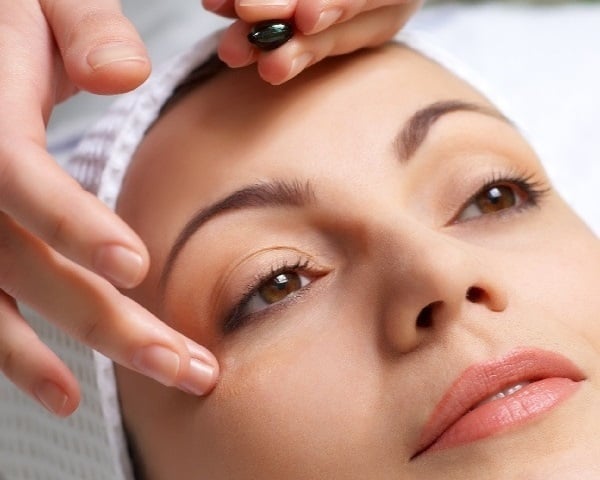Improving skin elasticity necessitates proper dietary routine and certain health care regimen to be followed. Scroll down for some fine tips to improve elasticity in aging skin.
Tips To Improve Elasticity In Aging Skin
Human skin possesses the ability to stretch and revert to its initial shape which is known as the elasticity of the skin. However, this particular feature of human skin is dependent upon health, tone and strength of the muscles beneath it. With aging, your skin tends to lose its elasticity and no longer remains as supple as it used to be. Factors such as genetics, diet, age and impurities accumulated in the skin pores may lead your skin to lose its elasticity. As a result, all of a sudden wrinkles start appearing on your face and the skin around other body parts also begins to look droopy. However, with a proper dietary strategy and certain skin care regimen, you can quite efficiently combat this crisis. A balanced dietary habit provides all the essential nutrients pivotal for your skin health and fosters your skin’s resilience while obviating skin discrepancies such as loss of elasticity which is concomitant to aging. Explore the lines below to equip yourself with all necessary information on how to improve elasticity in aging skin.

Image: MyTudut@flickr
Improving Skin Elasticity
Some Important Tips
-
Drink plenty of water as it helps keep your skin adequately hydrated and prevents it from getting dry. Remember, dry skin is more prone to premature aging and wrinkles as it tends to lose its elasticity very easily.
-
Sweating can be highly beneficial for the health of your skin. Sweating has many functions; it helps moisturize the skin, assists in restoring the pH balance of the skin and also allows the skin oils to spread equally throughout your skin. Now, if you want a supple and rejuvenated skin then you must make sure that it sweats.
-
The accumulation of dust into the pores of your skin can also make it lose its elasticity. It is highly important that you scrub and cleanse your skin on a regular basis to keep the skin pores dirt-free. It also helps in maintaining proper blood circulation which is extremely beneficial for the overall health of your skin.
-
Exercise daily. Regular exercise ensures a proper circulation of oxygen and nutrients to different body parts. Hormones have a significant role to play in your skin’s health. Exercising also balances hormones which can be beneficial for your skin’s health.
Nutrients Essential To Improve Skin Elasticity
Vitamin C
Food items rich in Vitamin C such as tomatoes, lemons, strawberries as well as leafy greens, must be consumed in adequate quantity in order to improve the elasticity of your aging skin. Vitamin C shields the skin from deleterious UV rays and most of the other skin hazards.
Vitamin E
Make sure to include foods with sufficient Vitamin E content, such as olive oil, sunflower oil, papaya, spinach, blueberries, kiwifruit, almonds, brussel sprouts and pumpkins, in your daily diet. Vitamin E helps nullify the damages caused by the Sun and also prevents the occurrence of wrinkles. It has been found to possess immense antioxidant properties and can rectify any cellular damage caused by the Sun, or other pollutants or even smoking.
Vitamin K
Foods with high Vitamin K content include turnips, leafy greens, broccoli and brussel sprouts. Vitamin K defends your skin against PXE (psuedoxanthoma elasticum), a frightening skin disorder which can hasten the appearance of wrinkles manifold.
Vitamin B Complex
Vitamin B facilitates the production of skin cells. It also plays a significant role in the retention of skin cell water. It also assists in restoring the plumpness of the skin by improving skin elasticity. Wheat bran, barley, tempeh, oats, potatoes, bananas, tuna and lentils are some of the foods items which have high Vitamin B complex content.
Essential Fatty Acids
Essential fatty acids are crucial for your skin’s elasticity. They are pivotal for the strength of the walls of your skin cells and aid the regeneration of your skin cells. Thus, don’t forget to include foods rich in essential fatty acids, such as hemp oil, salmon, flaxseed oil, sardines and pumpkin seeds, nuts (especially walnuts), soya oil, shellfish, pumpkin seeds, sunflower seeds and green leafy vegetables, in your everyday diet.
Antioxidants
Cocoa products, berries, green tea and dark leafy greens are great antioxidants. Antioxidants play a significant role in restoring the elasticity of your skin, and are also found to contribute to the content of collagen and elastin in your skin.
Silica
Some of the rich and natural sources of silica include leeks, cucumbers, celery, rhubarb, strawberries, mango and asparagus. The mineral silica is found to be effective in boosting the strength of the skin tissues, thus improving the elasticity of skin.
Improving your skin elasticity certainly entails certain skin care regimen to be undertaken on your part. Go through the lines above and try to implement the suggestions.
See also
More from iloveindia.com
- Home Remedies | Ayurveda | Vastu | Yoga | Feng Shui | Tattoos | Fitness | Garden | Nutrition | Parenting | Bikes | Cars | Baby Care | Indian Weddings | Festivals | Party ideas | Horoscope 2015 | Pets | Finance | Figures of Speech | Hotels in India : Delhi | Hyderabad | Chennai | Mumbai | Kolkata | Bangalore | Ahmedabad | Jaipur
- Contact Us Careers Disclaimer Privacy Policy Advertise With Us Lifestyle Sitemap Copyright iloveindia.com. All Rights Reserved.







